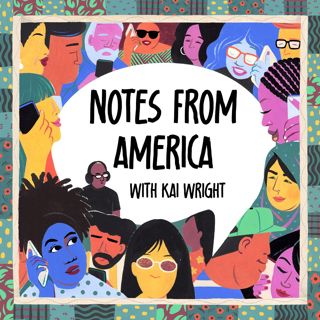
The Original Nasty Woman
Jeannette Rankin had a belief: That women were essential to the health of our democracy. She became the first woman elected to Congress over a century ago. Now, Kathleen Williams is vying to follow in her footsteps. Plus, what if we filled all 435 seats in the House with women? Would it make a difference? The United States of Anxiety is supported in part by the Economic Hardship Reporting Project. Additional support for WNYC’s election coverage is provided by Emerson Collective, The New York Community Trust, and New York Public Radio Trustee Dr. Mary White. Loading... Tell us what you think. We're @noteswithkai on Instagram and X (Twitter). Email us at notes@wnyc.org. Send us a voice message by recording yourself on your phone and emailing us, or record one here.Notes from America airs live on Sundays at 6 p.m. ET. The podcast episodes are lightly edited from our live broadcasts.
10 Okt 201832min

The 'Indoor Man' and His Playmates
Playboy was never just about the pictures or the articles. The magazine helped create a men's liberation movement, founded on the notion that men could have anything they wanted. From Donald Trump to Harvey Weinstein, Hugh Hefner's concept of the "indoor man" has had a lasting influence. The United States of Anxiety is supported in part by the Economic Hardship Reporting Project. Additional support for WNYC’s election coverage is provided by Emerson Collective, The New York Community Trust, and New York Public Radio Trustee Dr. Mary White. Tell us what you think. We're @noteswithkai on Instagram and X (Twitter). Email us at notes@wnyc.org. Send us a voice message by recording yourself on your phone and emailing us, or record one here.Notes from America airs live on Sundays at 6 p.m. ET. The podcast episodes are lightly edited from our live broadcasts.
2 Okt 201831min

The Pedestal
Paula Casey is on a mission. She wants to erect a statue in Memphis dedicated to those who fought for a woman’s right to vote more than a century ago. The problem: There’s a Confederate monument in the way. And… meet the woman who vowed to shut down women’s suffrage forever. The United States of Anxiety is supported in part by the Economic Hardship Reporting Project. Additional support for WNYC’s election coverage is provided by Emerson Collective, The New York Community Trust, and New York Public Radio Trustee Dr. Mary White. Tell us what you think. We're @noteswithkai on Instagram and X (Twitter). Email us at notes@wnyc.org. Send us a voice message by recording yourself on your phone and emailing us, or record one here.Notes from America airs live on Sundays at 6 p.m. ET. The podcast episodes are lightly edited from our live broadcasts.
25 Sep 201827min

We've Been Here Before
When Barbara Mikulski arrived in the Senate, all the podiums were built for men… and so was Washington's power structure. So she changed it. In this episode, Mikulski and three of her female Senate colleagues look back at Anita Hill's testimony and the 1992 elections that followed it, the last “Year of the Woman.” The United States of Anxiety is supported in part by the Economic Hardship Reporting Project. Additional support for WNYC’s election coverage is provided by Emerson Collective, The New York Community Trust, and New York Public Radio Trustee Dr. Mary White. Tell us what you think. We're @noteswithkai on Instagram and X (Twitter). Email us at notes@wnyc.org. Send us a voice message by recording yourself on your phone and emailing us, or record one here.Notes from America airs live on Sundays at 6 p.m. ET. The podcast episodes are lightly edited from our live broadcasts.
18 Sep 201818min

The Dream Was Not Mine
Jennifer Willoughby was in an abusive marriage. Saily Avelenda was unhappy with her congressman, who'd held office for over two decades without facing a serious contender. They didn’t know they were about to topple two political giants. Plus, want to know the real reason the 2018 midterms could make history? It has to do with a number political scientists call the "gender gap." Note: WNYC made several attempts to reach Rob Porter for comment. He did not respond before this episode was released. The United States of Anxiety is supported in part by the Economic Hardship Reporting Project. Additional support for WNYC’s election coverage is provided by Emerson Collective, The New York Community Trust, and New York Public Radio Trustee Dr. Mary White. Tell us what you think. We're @noteswithkai on Instagram and X (Twitter). Email us at notes@wnyc.org. Send us a voice message by recording yourself on your phone and emailing us, or record one here.Notes from America airs live on Sundays at 6 p.m. ET. The podcast episodes are lightly edited from our live broadcasts.
17 Sep 201836min

The United States of Anxiety Season Three: There's an Election Coming
Women gained the right to vote nearly a century ago. Yet, power is still concentrated in the hands of men. In a year that’s seen a surge of female candidates, the question at the heart of the 2018 midterms is: Who is our democracy for? Tell us what you think. We're @noteswithkai on Instagram and X (Twitter). Email us at notes@wnyc.org. Send us a voice message by recording yourself on your phone and emailing us, or record one here.Notes from America airs live on Sundays at 6 p.m. ET. The podcast episodes are lightly edited from our live broadcasts.
14 Sep 20183min

The US of Anxiety Wants to Hear from You
A record number of women are running for office this primary season, which means there's a groundswell of energy around targeting female voters with campaign ads. For our next season of the United States of Anxiety, we’re focusing on power and gender, and we’ve partnered with ProPublica to look at how political advertising targets people of different genders differently on Facebook. Unlike broadcast television ads, which are heavily regulated, we have no idea how individual voters are micro-targeted on Facebook. It’s still the Wild West. Nor do we know about potentially unethical or misleading advertising that may be happening. We do know from the Cambridge Analytica scandal that much of the misinformation spread in 2016 targeted people based on their race and gender. And we know that this is an election in which gender is expected to be a decisive factor. What can you do? Download the ProPublica Ad Tracker Extension - You can download the Facebook Political Ad Collector from the Chrome Web Store or the Mozilla Add-ons Store. NOTE: ProPublica is NOT collecting any private information from you. The plugin simply copies the ads you are seeing in your unique feed. You can read more about how ProPublica is protecting your privacy here. See the ads that other people are seeing - take a look through ProPublica’s database of political ads Send us tips - Have you seen any political ads that appear to target you by your gender? Or target you by your race? Have you seen any political ads that appear to celebrate women? Or any ads that seem misogynistic? Take a screenshot and email us at narrative@wnyc.org to tell us what you’re seeing. By doing this, you'll be part of groundbreaking research — remember this is the first election cycle since Facebook changed its policies. And you'll also be helping WNYC and ProPublica bring you reporting and analysis about these campaign ads. To get started, visit propublica.org/facebook. Tell us what you think. We're @noteswithkai on Instagram and X (Twitter). Email us at notes@wnyc.org. Send us a voice message by recording yourself on your phone and emailing us, or record one here.Notes from America airs live on Sundays at 6 p.m. ET. The podcast episodes are lightly edited from our live broadcasts.
9 Aug 20184min

Introducing ‘Caught’: Our New Podcast
America incarcerates more people than any country in the world. It starts with kids. On any given night, roughly 53,000 young people are in some form of lockup. Nearly 60 percent are black or Latino. We all make dumb mistakes in our youth. But for these kids, those same destructive choices have a lasting impact. Mass incarceration starts young. From the team that brought you The United States of Anxiety, Caught: The Lives of Juvenile Justice tells the stories of young lives forever changed by collisions with law and order. In this episode, meet Z, a kid who had his first encounters with law enforcement when he was just 12 years old. Now, at 16, he’s sitting in detention on an armed robbery charge. Z's story introduces the questions: What happens once we decide a child is a criminal? What does society owe those children, beyond punishment? And what are the human consequences of the expansion and hardening of criminal justice policies that began in the 1990s – consequences disproportionately experienced by black and brown youth? Caught: The Lives of Juvenile Justice is supported, in part, by the Anne Levy Fund, Margaret Neubart Foundation, the John and Gwen Smart Family Foundation, and the Economic Hardship Reporting Project. Subscribe on iTunes. Tell us what you think. We're @noteswithkai on Instagram and X (Twitter). Email us at notes@wnyc.org. Send us a voice message by recording yourself on your phone and emailing us, or record one here.Notes from America airs live on Sundays at 6 p.m. ET. The podcast episodes are lightly edited from our live broadcasts.
20 Mar 201829min





















